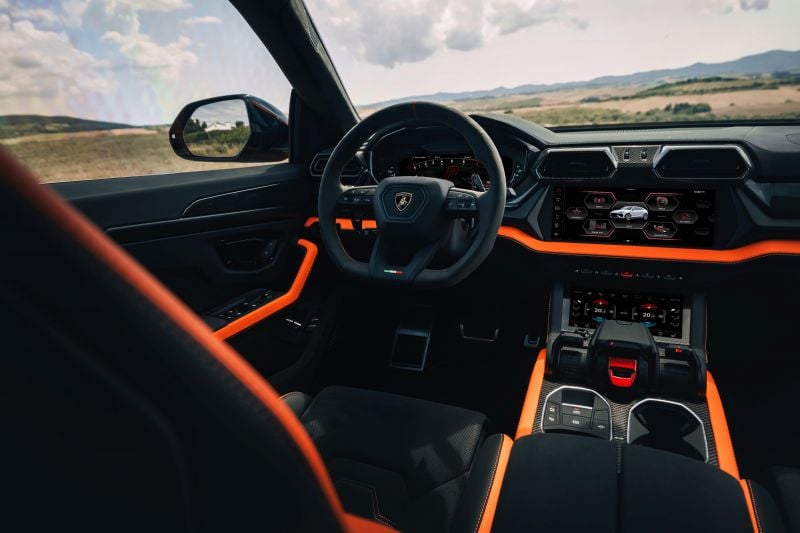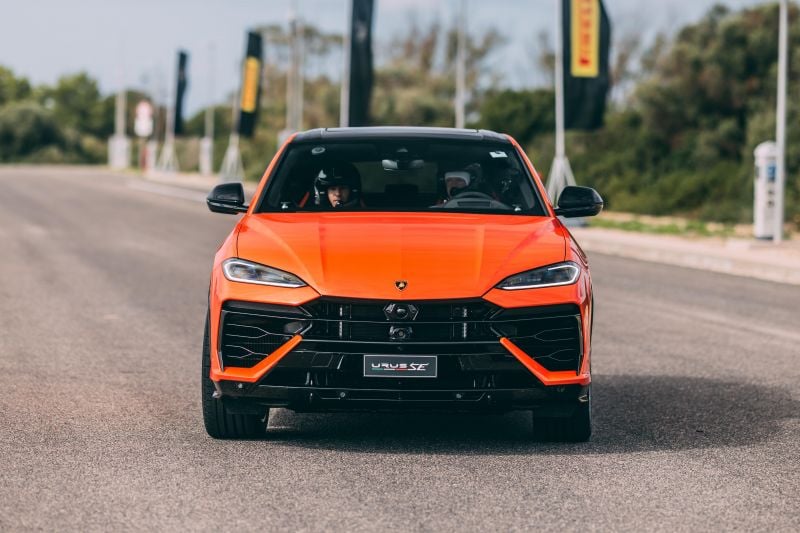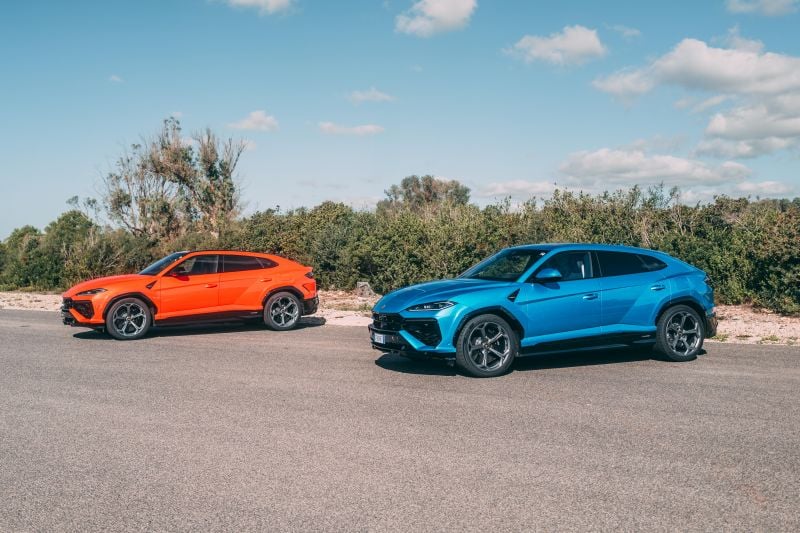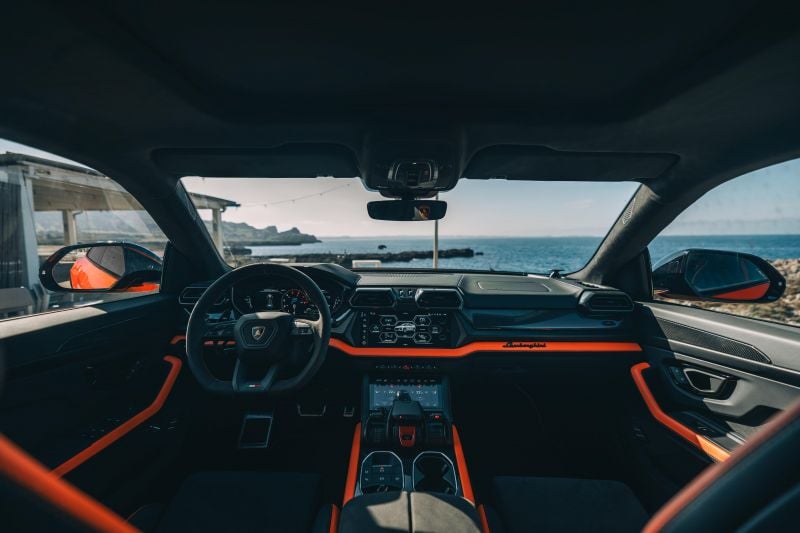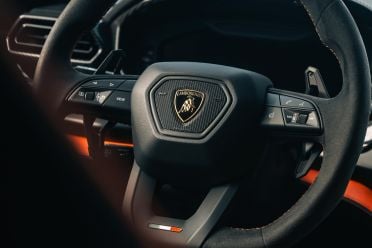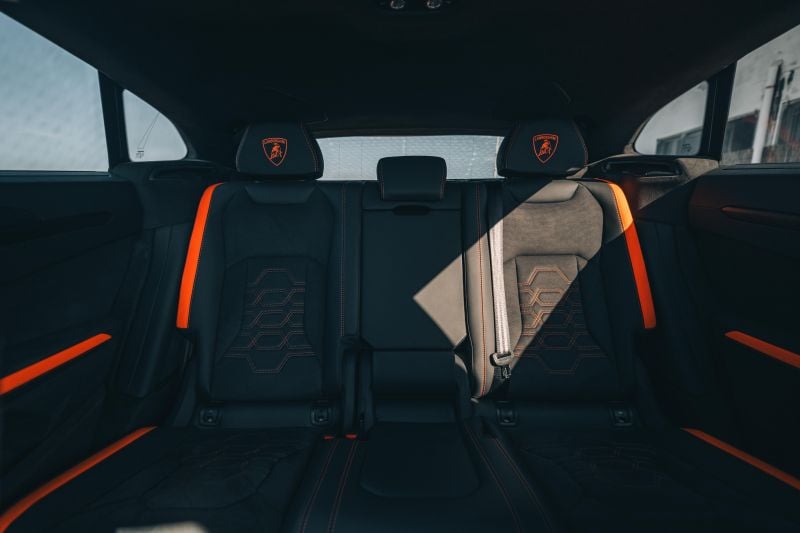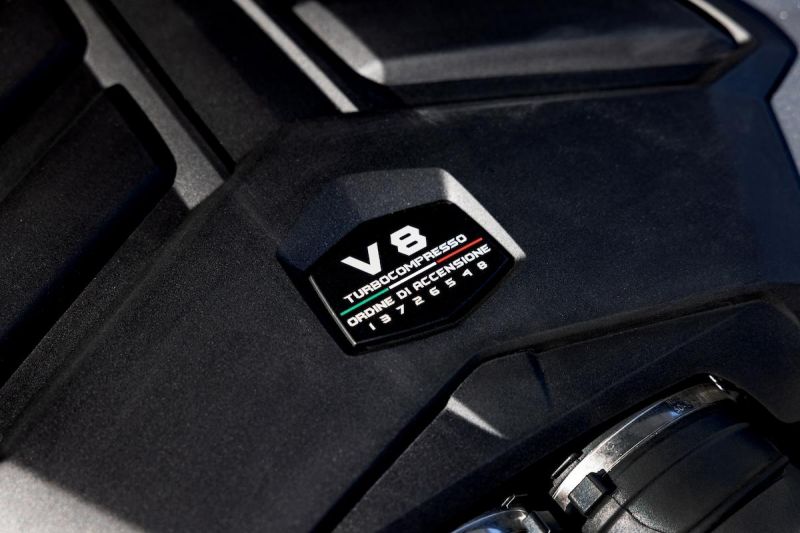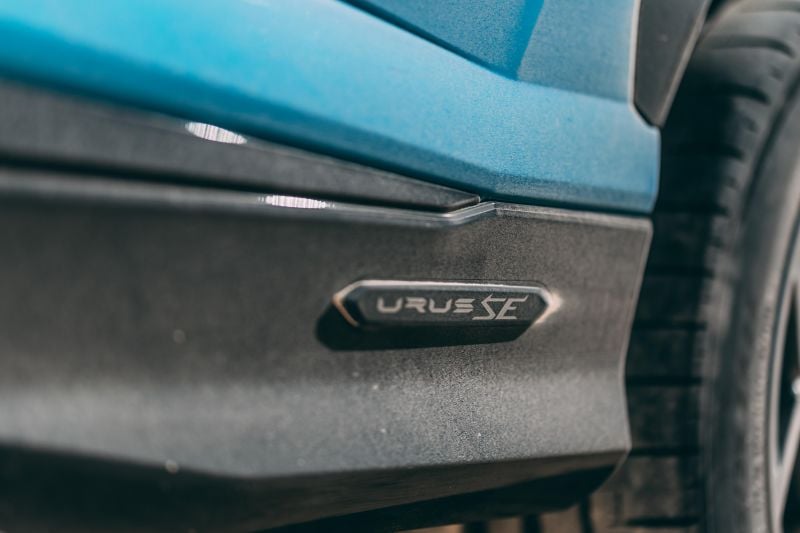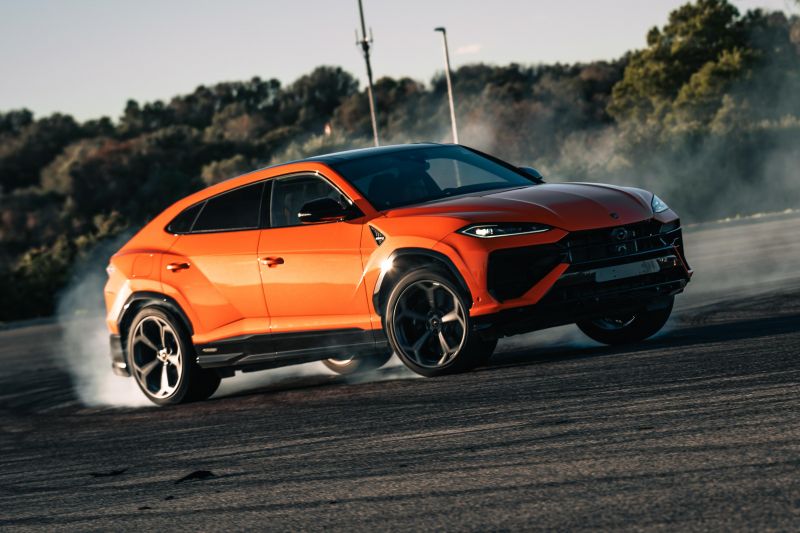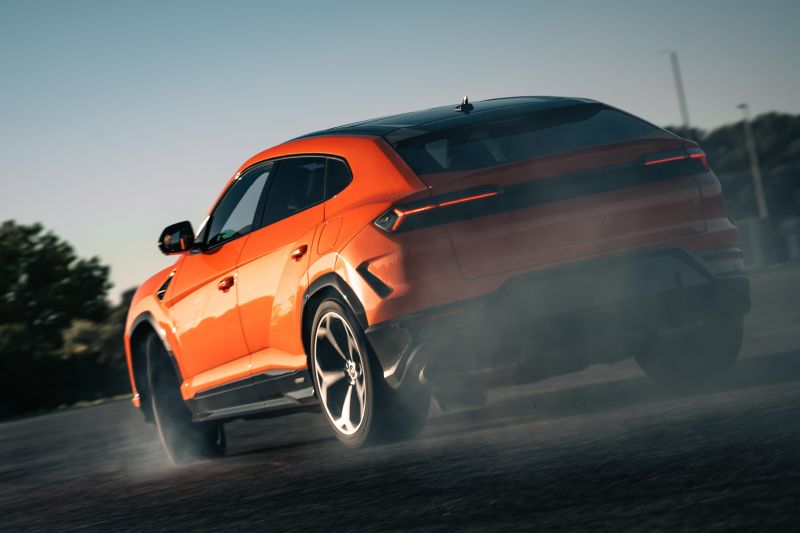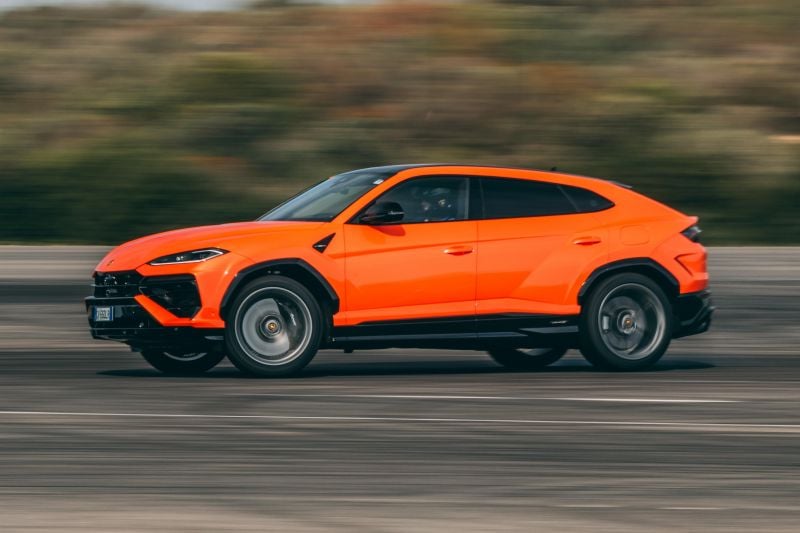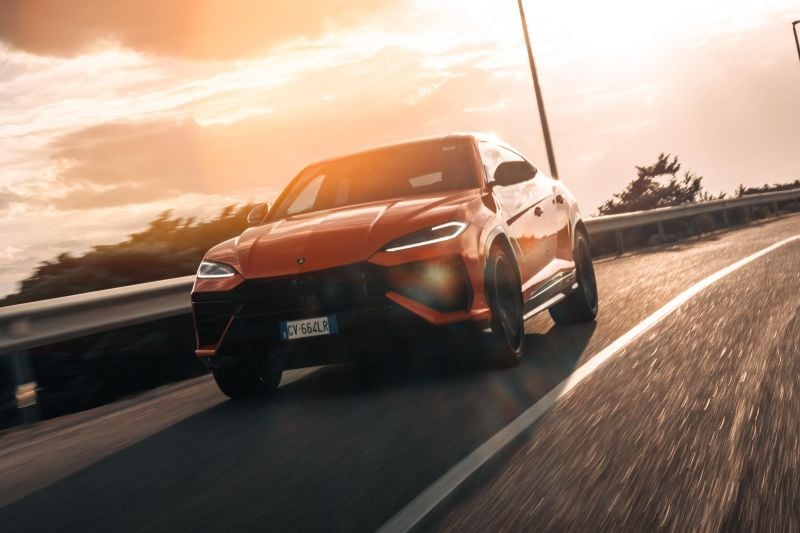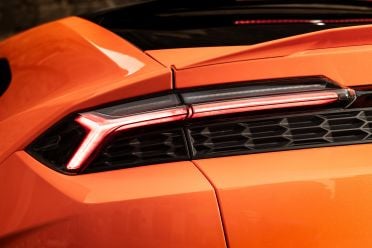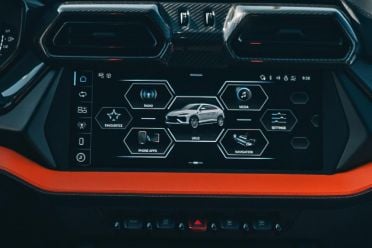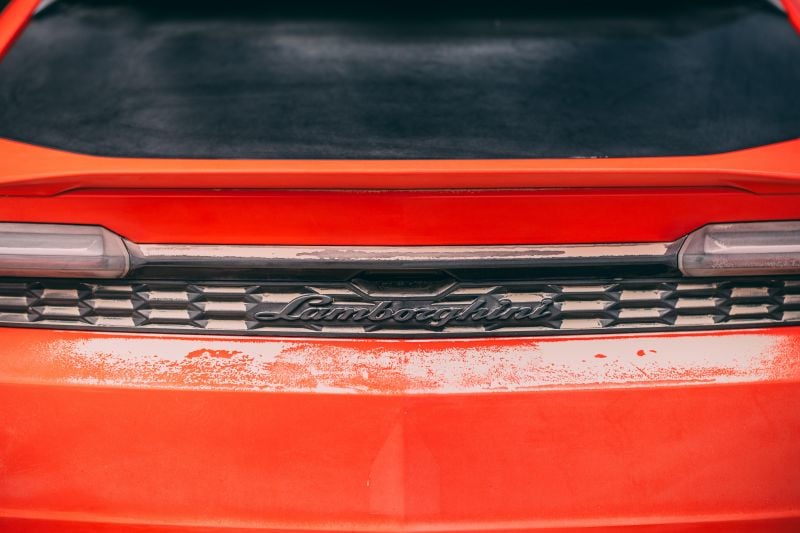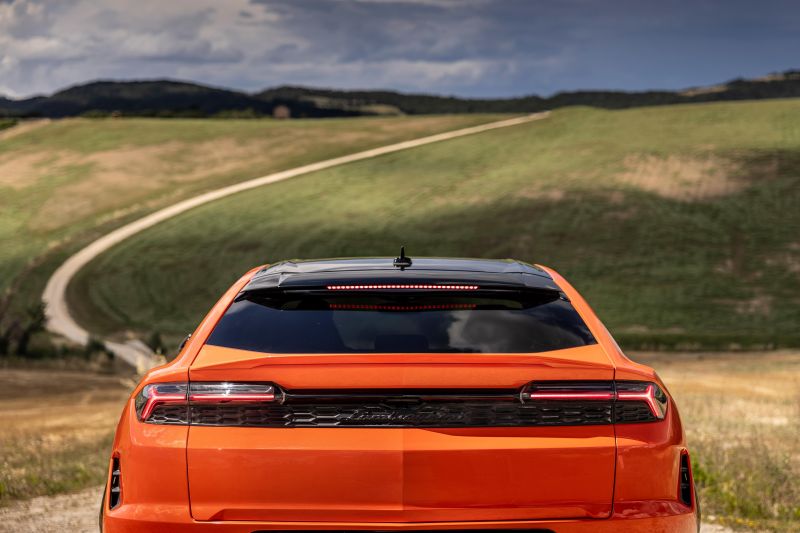Hybrids, especially plug-in hybrids (PHEVs), tend to be more about efficiency gains, emissions reduction and a bit of a yawn, unless of course it’s the first electrified Lamborghini SUV to roll silently out of the factory gates at Sant’Agata Bolognese.
This is a different type of hybrid entirely, boasting benchmark power outputs and perhaps more of those efficiency gains that you might have imagined possible from the Raging Bull – a brand better known for its sledgehammer supercar performance and some of the greatest sounding engines on the planet.
While some might regard this hybridised SUV as just another addition to the successful Urus family that kicked off in 2018, it looks and feels more like a next-generation model given the game-changing aspects it brings to the fore.
It’s more polished, more resolved and indeed more elegant than its older Urus stablemates thanks to new front and rear styling treatments that draw inspiration from both old and new Lamborghini models.
Most obvious is the bonnet. It’s completely new and reimagined with design elements inspired by the latest and greatest of Sant’Agata’s super sports cars – the similarly-hybridised Revuelto as well as the generations-old Gallardo.
The bonnet jettisons shutlines, and the central peak has been lowered for a floating look, yet there’s still a power dome for an even more sinister demeanour.
The front grille is now a more open design with integrated triangular aero elements that add more fluidity, and it pairs seamlessly with the Urus SE’s new headlight cluster that uses Matrix LED technology for the first time.
At the rear it’s the same dual-purpose redesign for the Urus SE that incorporates a brand-new hatch design, combining three-dimensional styling elements with a more pronounced centre peak and a mesh look taken from the Gallardo.
More obvious is the dramatic lowering of the licence plate on a new, more aero-friendly diffuser that in concert with a new spoiler sees the dual-powered Urus achieve 35 per cent more rear downforce at speed, claims Lambo.
Underbody and out of sight are new air vents and enhanced air ducts that combine to increase critical cooling of the engine and other mechanical components by 15 per cent over the Urus S. Up front it’s as much as a 35 per cent improvement of the previous design.
Capping it all off and at both ends is a new light signature (call it part of an all-new design language) that looks to the bull’s tail for ultimate inspiration.

How much does the Lamborghini Urus cost?
Lamborghini has already confirmed the plug-in hybrid Urus SE will be priced from $475,834 before on-road costs, making it more expensive than even the track-focused Urus Performante that’s priced from $465,876 plus on-roads.
Mind, the Urus is bookended at the entry-level by the Urus S, priced from $409,744 excluding on-roads.
| Model | Price before on-road costs |
|---|---|
| 2025 Lamborghini Urus S | $409,744 |
| 2025 Lamborghini Urus Performante | $465,876 |
| 2025 Lamborghini Urus SE | $475,834 |
To see how the Urus lines up against the competition, check out our comparison tool.
What is the Lamborghini Urus like on the inside?
Lamborghini’s interior design team followed one principle design DNA philosophy: ‘Feel like a pilot’. But the theme also brings extra emphasis on a clean look by using softer, more premium materials for the touch points and better ergonomics for ease of use while on the move.
It’s always been that way to a major extent, as evidenced by the likes of the Tamburo selector unit and accompanying red switch that covers the start/stop button. It’s still one of the coolest pieces of automotive theatre that does its best to mirror the ‘weapons hot’ switch in a cutting-edge fighter plane – and it simply never gets old.
In the Urus SE the entire dash has been revamped with a more minimalistic and better organised look, along with an obvious upgrade in the quality of materials used, including lightweight carbon-fibre and brushed metal, in addition to the improved ergonomics.
There’s been special attention applied to smaller details like softer Alcantara surfacing that encourages comfortable palm-resting while using the new digital climate control screen.
Lamborghini, more than any of its rivals, wants its Urus pilots to be properly integrated into the SE’s cockpit, and as such already claims the lowest seat position in the super SUV segment as well as the correct inclination of the steering wheel.
Look closely and you’ll see some interesting materials at play here, like the black brushed aluminium that blends beautifully with the lacquered carbon-fibre above. Even the leather trim looks and feels like a cut above anything we’ve previously seen inside the Urus.
There’s no question the driver is nicely coddled in one of the best luxury sports seats in the business.
The new dashboard design takes on that flight deck appearance more than ever before, but with a higher level of intuitiveness. That’s despite the myriad big screens, levers and switches on display.
Along with the cleaner, more horizontal look of the dash, there are newly shaped air vents that give the overall appearance of being less showy and less geometrical in shape. Again, it all looks more resolved and in keeping with Lamborghini’s ever-evolving design language.
The newly designed Tamburo drive selector is still flanked by the Anima lever for the six drive modes – Strada, Sport, Corsa, Sabbia, Terra, Neve – but you’ve also got another lever with a series of buttons to engage either EV, Hybrid, Recharge and Performance modes.
With an overall length of just over 5.1 metres, there’s a stack passenger and luggage space inside the Urus SE, which offers more than 600 litres of cargo capacity with the second row in place and just under 1600L when folded.
What’s under the bonnet?
According to Lamborghini chief technical officer Rouven Mohr, the Urus SE shares its twin-turbo V8 powertrain with the Porsche Cayenne Turbo E-Hybrid – “but only the basics”, because the Lambo’s powertrain has been completely revised, blitzes the Porsche’s 544kW/950Nm outputs and also betters it across multiple key performance metrics.
The hybridised Urus SE’s 4.0-litre V8 manages to extract 456kW of power and 800Nm of torque on its own, before the electric motor kicks in with another 141kW and 483Nm.
The two power sources combined develop a total of 588kW and 950Nm from just 1750rpm, making it the most powerful SUV in its segment and trumping not only its Porsche cousin, but also heavy hitters like the Aston Martin DBX707 (520kW/900Nm), Ferrari Purosangue (533kW/716Nm) and Bentley Bentayga Speed (467kW/900Nm).
For what it’s worth, it also makes considerably more power and torque than the Rolls-Royce Cullinan Black Badge, despite the Rolls packing a twin-turbo V12 under the bonnet (441kW/900Nm) and an equally hefty price tag of $810,000 before options and on-roads.
The electric motor can either boost the power of the internal combustion engine or, if EV mode is selected, drive the Urus SE on purely electric power for a claimed distance of more than 60km at speeds up to 130km/h, thanks to a big 25.9kWh lithium-ion battery housed beneath the floor.
Interestingly, that permanent magnet synchronous electric motor is compact enough to be bundled into the same housing as the eight-speed auto transmission, which also enables the Urus SE to drive all four wheels while in EV mode.
Despite Urus SE’s Herculean performance outputs, emissions are said to be reduced by more than 80 per cent, at 51.25g/km of CO2 versus a whopping 320g/km for Urus S.
Lamborghini claims its dual-power Urus SE will blast from standstill to 100km/h in 3.4 seconds (3.5s for Urus S), and to 200km/h in 11.4 seconds (12.5sec for the Urus S). Top speed is 312km/h whereas the Urus S tops out at 305km/h.
Given the Urus SE’s huge output gains over its siblings you might have expected more, however, rumours were awash at the launch that the replacement for the track-focused Urus Performante would be also be a hybrid but likely using a smaller battery and more lightweight body panels.
Might it be called the Urus Performant-E?
To see how the Urus lines up against the competition, check out our comparison tool.
How does the Lamborghini Urus drive?
Mohr is the first to admit it’s not all about the power stakes with Urus SE. Rather, it’s as much about driver feedback, steering feel and especially the fun factor behind the wheel.
No surprise then that the drive program at the international launch of Urus SE in Italy was devoid of the usual racetrack component, instead focusing on gravel and sand along with some power drifting on bone-dry asphalt.
While I couldn’t quite get a precise number on the extra mass that comes with hybridising a monster-size SUV like the Urus – it’s around 150kg or more according to the rumour mill.
Remarkably, though, that’s not something you immediately feel when you’re at liberty to give it full throttle out of a tight right-hander, or while ripping the 23-inch bespoke P Zero rubber to literal shreds by way of 360-degree drifts on that same ultra-grippy asphalt mentioned previously.
While the launch cars wore huge 23-inch wheels, the standard wheel size is 21 inches – though buyers can also choose 22-inch wheels for their lightweight properties and peak dynamic performance.
Brake feel is superb and high-speed braking performance is bulletproof, thanks to massive carbon-ceramic stoppers measuring 440mm up front with 10-piston calipers, and 410mm down back.
Just as the Urus SE has benefited from Lamborghini’s changing design language, so too have the vehicle’s dynamic systems in this electrified version.
There’s myriad different drive modes and combinations for the driver to explore, and all of them affect a whole gamut of things including steering feel (which is now a tad lighter), transmission mapping, suspension damping and engine note.
You’ve still got the choice of Strada, Sport and Corsa – the latter a proper track-only mode. But you’ve also got Neve, Sabbia and Terra for loose, wet or low-grip surfaces.
But with its PHEV powertrain the Urus SE adds EV Drive, Hybrid, Performance and Recharge modes that work in concert with the actual drive mode themes.
We dialled up Terra and Performance and hit the gravel circuit, which was also layered with soft dry sand, so sideways action was plentiful to say the least.
Mohr is bang-on in that regard. It’s endlessly fun as the car makes you look like something of a rally god – but we all know it’s both the calibration and marriage of the sizeable array of electronic modules and mastery that make its performance so accessible.
There’s plenty of refinement with the two power sources working hand-in-hand in such a seamless fashion, yet you’re simply unaware of the EV assistance when it does arrive.
However, when both powertrains combine even just in Sport at full noise, it’s ferociously quick from anywhere in the rev range. It feels ‘Performante’ fast, yet still with that brilliant eruption of twin-turbo V8 anger at its resonant best.
There’s no drift mode as such, but dial up Sport with ESC completely off and give it full beans with a quarter steering lock and the Urus will drift and burn rubber quite easily.
Ride comfort has always been good in the Urus – even the Performante offers decent compliance despite its passive suspension setup.
But the SE benefits from air suspension so ride compliance is first rate and nicely tied down at the same time.
Another benefit of the Urus SE’s air suspension is its ability to adjust ground clearance depending on drive mode. In Corsa it drops 15mm, but at the other end of the scale it can raise the vehicle by up to 75mm.
There wasn’t nearly enough time to properly explore all the mode combinations available, but there appears to be endless breadth to the car’s dynamic parameters by way of the SE’s 48V active anti-roll bars, semi-active dampers, rear-wheel steering and those 11 drive modes.
What do you get?
The Lamborghini Urus SE is now the flagship variant in the range.
Lamborghini Urus SE highlights:
- Matrix LED headlights
- 21- to 23-inch alloy wheels
- Pirelli P Zero tyres
- 12.3-inch digital instrument cluster
- 12.3-inch touchscreen infotainment system
Almost all Lamborghini Urus vehicles are customised and the SE will likely inspire even more use of the brand’s Ad Personam program to tailor both exterior and interior elements.
For example, the exterior colour range boasts more than 100 paint options now, while interior choices number 47 colour combinations.
However, unofficially there are said to be more than 500 colour and material combinations available to Urus buyers.
To see how the Urus lines up against the competition, check out our comparison tool.
Is the Lamborghini Urus safe?
The Lamborghini Urus has not been tested by ANCAP or Euro NCAP.
As the car is based on the Volkswagen Group MLB Evo platform, the five-star ANCAP result of the Audi Q8 is likely indicative of how the Urus would perform in a crash.
How much does the Lamborghini Urus cost to run?
The Urus is backed by the same three-year, unlimited-kilometre warranty as the wider Lamborghini range, although fourth and fifth-year warranty extensions can be purchased.
Lamborghini doesn’t provide servicing costs for its cars, just in case you need to ask.
To see how the Urus lines up against the competition, check out our comparison tool.
CarExpert’s Take on the Lamborghini Urus
While hybridisation of its largest model might seem like a no-brainer for a company known for creating some of the most outrageous supercars ever, Lamborghini might have just pulled of its greatest triumph ever in the Urus SE.
If the order bank is anything to go by, all of 2025’s production is already spoken for – and most buyers are yet to see it in person, let alone drive it, so expect orders to push out well into 2026.
Not only has Lamborghini managed to create the most powerful SUV in its segment, but in its steadfast dedication to sustainability it’s also pulled off an emissions miracle with a hybrid system that effectively allows for daily EV commuting.
Not a bad selling point for one of the best sounding SUVs on the planet.
Interested in buying a Lamborghini Urus? Get in touch with one of CarExpert’s trusted dealers here
Click the images for the full gallery






